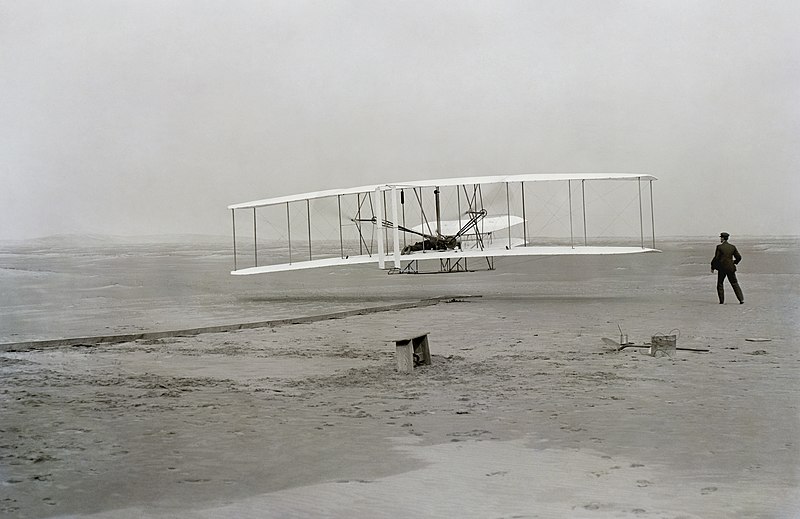During my week in the Outer Banks, I braved rain and high water to visit the Wright Brothers National Memorial at Kill Devil Hills. Even on a do-nothing-and-relax vacation, as this one was supposed to be, I couldn't resist visiting something historical and museum-y.
This boulder and metal track in the ground mark the takeoff point of the Wright Brothers' Flyer, and the four smaller plaques in the distance mark where the first four successful flights landed on December 17th, 1903.
 |
| First successful flight of the Wright Brothers |
One hundred and twenty feet. That's how far Orville Wright got on his first successful powered flight, which the brothers were smart enough to capture on film. It is amazing to me that there is a photograph of this huge step forward in technology, this incredible achievement. And this all happened in 1903, which isn't really all that far away if you think about it. Not much more than a hundred years from their success in flight, we used a rocket-propelled sky-crane to gently lower an automobile-sized rover onto the surface of Mars.
I bring up the Mars Curiosity rover not only because it's awesome and on Mars, my favorite planet that I don't currently live on, but because we stayed up late on Sunday night, in the big rented house on the beach in Avon, and hooked up the TV to the internet to watch the live feed from NASA as they monitored Curiosity's descent to the surface.
Four of us, and a couple of sleepy weenie-dogs, settled in on the cushy sofas for the whole thing, from the interviews with NASA engineers to the triumphant cheers and tears of joy on the big screen when a safe landing was confirmed. More than once that night, as we watched the camera pan over the control room and the excited and nervous NASA folks speaking into their headsets, I was overwhelmed with a sense of awe and insignificance. Not only are we at a place in our evolution as a species that we can safely place sophisticated technology onto other planets, but it's become routine enough that it's not much more than a blip on the news. Sure, the nerds and space geeks of the world were huddled in front of their TVs and computers to watch it all unfold, but there's a bit of a "been there and done that" feeling from the news coverage, and that makes me both happy and sad.
I'm happy, because it means that awesome feats like this have become common enough not to make a big splash. Not only can we send stuff to Mars, or Jupiter, or to explore giant asteroids, but we do it all the time. We are an amazing damn species. But I'm sad, because when events are common, they stop being news, and people stop caring. When people stop caring, people forget why we're doing all of this in the first place and see it as a waste of money and resources.
But it's not a waste. No, it's not directly ending world hunger or fixing the economy, but space exploration has brought us so many advances in technology, and is worth every penny put into it. And, frankly, it's only pennies that are put into it. NASA's budget is a joke, and the joke keeps getting smaller. This comparison puts it into perspective:
I'm not trying to get all political here - I still don't have a vote in this country - but when you see how little NASA gets from the US budget, it's hard to understand the folks who are complaining that we're spending so much money to visit other planets for nothing. Especially when you see this:
Not that I'm bashing the Olympics (just NBC's dismal coverage and overuse of Ryan Goddamn Seacrest), but in the grand scheme of things, we get so much out of space exploration, and it's silly to argue against funding it. It's not just about rockets, minerals, and spectral analyses. It's about engineering, programming, and robotics, and dozens of other applications to medicine and nutrition and memory foam mattresses.
Three days after I watched Curiosity touch down gently on Mars to begin its mission of exploring the planet, I stood in the spot where we first took to the air in powered vehicles, and I whispered a thanks to the Wright brothers and all those who built on their work, for what they've made possible so far.



No comments:
Post a Comment